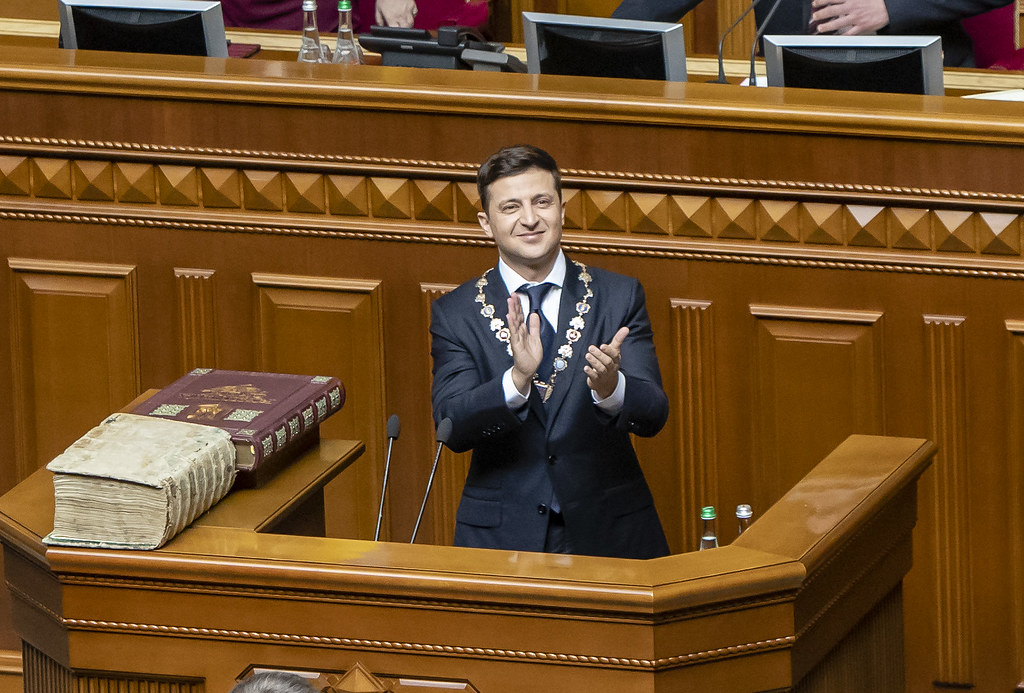Zelensky’s Communication Strategy
From comedian to state hero, Volodymyr Zelensky has become a unique example of 21st century political communication and leadership in the face of geopolitical ruptures caused by Russia’s war against Ukraine. In a demonstration of moral strength and courage, the Ukrainian president refused an offer from the United States of evacuation from Kyiv. Since the 24th of February 2022, the main aim of Zelensky’s communication has been to demonstrate to the international community that Russia’s aggression against Ukraine is tantamount to an aggression against the entire free world.
Zelensky’s political speeches have mobilised the global community to respond to Russia’s invasion and to provide military, financial and humanitarian support to Ukraine. According to the Ukraine Support Tracker at the Kiel Institute for the World Economy, over 140 billion euros in government-to-government commitments were made within the first year alone. This includes military, humanitarian, and direct financial aid.
Emotions in the Study of International Relations
With the advent of the 21st century, emotions began to be more systematically integrated into the study of international relations (IR) theories. The term itself emotion is derived from the Latin verb motere, meaning movement. Through an IR lens, it is therefore pertinent that emotions become triggers for political mobilisation of the target audience on a particular issue.
An article by Simon Koschut in April 2022 argues that war, like other crisis situations, provokes emotions which are mainly expressed through discourse. The emotional discourse of Zelensky in the face of war can thereby be perceived as a turning point in the process of political communication since the Second World War. The way in which Zelensky emotionally conveys Ukraine’s pain, expectations and strategic objectives on the international stage largely reflects the course of the war.
A Relatable Emotion: Anger
By conveying anger, Zelensky underscores the emotional and moral divide between the Self (Ukraine) and the Other (Russia). For instance, he characterises Russians as “evil” invaders of Ukrainian land, and Russian soldiers are referred to as “savages”; ignorant of the values of the civilised world. Their indeed brutal behaviour is described with the term “barbarism”. Anger as a reactive emotion is often accompanied by accusations against the subject who violated certain norms, which Zelensky makes use of, too.
By using these terms, Russia is portrayed at an international level as an immoral, dishonest, and sinister actor whose villainous actions in Ukraine are contrary to the values of the civilised world. This serves to foster a sense of indignation amongst the international community; and crucially with Ukraine’s allies. This reinforces the effect of Russia’s threat to the West and frames Russia’s actions in Ukraine as an existential problem.
Invoking Guilt
Zelensky’s discourse often inspires guilt, highlighting to some extent, the lack of political will of some foreign nations. Zelensky thereby puts pressure on the countries that are still debating issues such as providing aid. In Zelensky’s speeches, foreign countries are blamed for their indifference; for example, indifference to both the closing of the Ukrainian airspace as well as the protection of Ukrainian cities under Russian attack.
Furthermore, in a speech published in the Cortes Generales in Spain, Zelensky uses emotionally charged rhetorical questions, attributing blame to the activities of a series of Spanish companies in Russia. Countries are urged to drastically reduce their purchase of energy resources from Russia. Zelensky also shamed European countries that have not done so for failing to ban and shut down Russian propaganda channels.
Connecting with the Audience via Sympathy
By expressing sympathy for the painful past of the nations that he speaks to, Zelensky forms a close relationship with his target audience. For example, in his address to the Polish parliament, the Sejm, he sensitively compared the Ukrainian struggle to the 2010 Smolensk air disaster, in which then-Polish president Lech Kaczyński, his wife, and high-ranking government officials were killed. When addressing the US Congress, Zelensky referenced tragic events in US history that are still in the collective, traumatic memory of most Americas, such as the attack on Pearl Harbor during World War II and the terrorist attacks of September 11th 2001.
Zelensky also emphasises that Ukraine shares common values and principles with the West. The aim is not only to highlight the importance of a values-based foreign policy in the current context, but also to demonstrate that financial and military support to Ukraine is a significant investment in global security. The symbolic as well as very tangible support and solidarity from the international community, which Zelensky mentions in his speeches, show that the audience empathises with Ukraine’s suffering.
Nonverbal Cues in Zelensky’s speeches
What caught many people’s attention -and even some criticism- is that Zelensky abandoned the traditional political dress code for the duration of the war. His suit and tie have been replaced by a green army-style shirt or hooded sweatshirt that he visually shows he is a part of, albeit unwillingly. Zelensky’s speeches show how he strives to maintain direct eye contact with his audience. This builds confidence in him as a political leader and simultaneously signals the content of his communication to be reliable and trustworthy. Meanwhile, politicians’ avoidance or diversion of eye contact can be viewed negatively. In several speeches, Zelensky holds one of his hands close to his chest. Across many cultures, this gesture is associated with honesty and sincerity. Zelensky’s sincerity and honesty is also shown by his open palms. At the end of some speeches, Zelensky puts up a clenched fist to express the strength of the nation and its unity.
A Pathway to Successful Strategic Communication
The verbal and non-verbal style of Zelensky‘s speeches, driven by a range of emotions, will likely influence the evolution of communication of political leaders on a global scale. To understand the methods and effects of Zelensky’s communication is to understand how overall trends in political leadership and communication are set to evolve.









